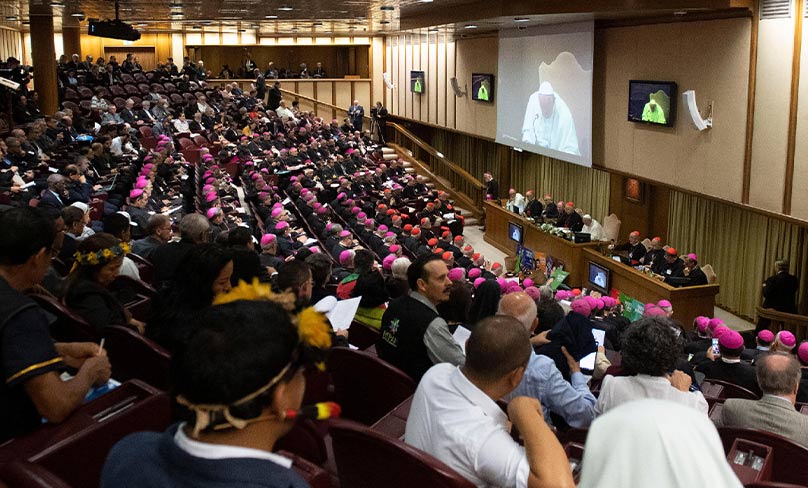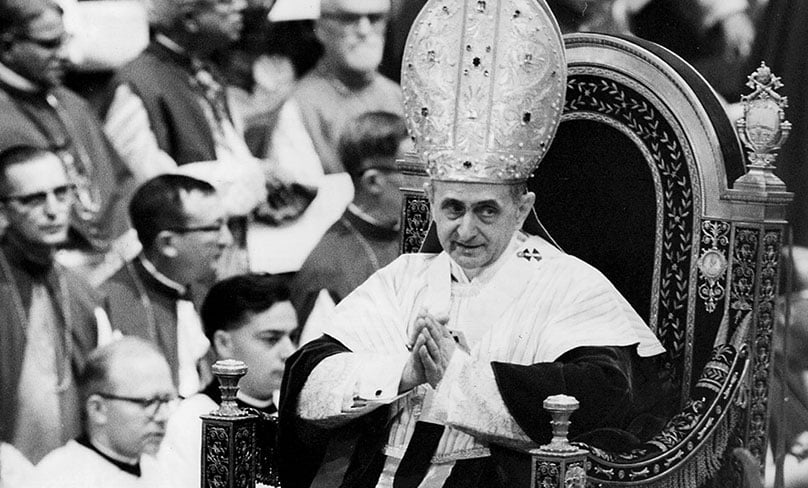
The Second Vatican Council spoke of the sensus fidei in its Dogmatic Constitution on the Church Lumen gentium. As we know, it was the belief for centuries that the Holy Spirit would not allow the whole Church to be led into error.
Lumen Gentium goes further and teaches formally the infallibility of the Church: “The whole body of the faithful who have an anointing that comes from the holy one (cf. 1 Jn 2:20, 27), cannot err in matters of belief.
This characteristic is shown in the supernatural appreciation of the faith (sensus fidei) when, from the bishops to the last of the faithful, they manifest a universal consent in matters of faith and morals. By this appreciation of the faith, aroused and sustained by the Spirit of Truth, the People of God, guided by the sacred teaching authority (magisterium), and obeying it, receives not the mere word of men, but truly the word of God” (LG 12).
We see here how the People of God are infallible in their believing when they are united with their bishops and they obey the magisterium, the teaching authority of the Church.
The International Theological Commission’s document Sensus fidei in the Life of the Church makes the important point that over the centuries the lay faithful have had an important role to play in the development of the Church’s teaching on such issues as the morality of receiving interest on a loan, matters of social doctrine and the question of human rights and religious freedom.
In the end, however, it is up to the magisterium of the Church to judge which contributions of the lay faithful “actually correspond to the truth of the Tradition received from the Apostles” (n. 77).
It has sometimes been said that only upon the acceptance of Church teaching by the faithful, including bishops, priests and lay faithful, does a teaching have authority. This is false. The First Vatican Council taught that infallible definitions of the Pope are irreformable “of themselves and not from the consent of the Church” (Pastor Aeternus, Ch. 4).

The ITC’s document comments that “such teaching of the Pope, and by extension all teaching of the Pope and of the bishops, is authoritative in itself because of the gift of the Holy Spirit, the charisma veritatis certum [the certain charism of truth] that they possess” (n. 79).
What happens when a teaching of the Church is met with opposition from a body of the faithful, as has sometimes happened?
The document says that in this case action is required on both sides: “The faithful must reflect on the teaching that has been given, making every effort to understand and accept it. Resistance, as a matter of principle, to the teaching of the magisterium is incompatible with the authentic sensus fidei. The magisterium must likewise reflect on the teaching that has been given and consider whether it needs clarification or reformulation in order to communicate more effectively the essential message” (n. 80).
How does public opinion, even a majority opinion, on Church matters relate to the sensus fidei?
The document answers that “the sensus fidei cannot simply be identified with public or majority opinion in the Church. Faith, not opinion, is the necessary focus of attention. Opinion is often just an expression, frequently changeable and transient, of the mood or desires of a certain group or culture, whereas faith is the echo of the one Gospel which is valid for all places and times.”Moreover, “In the history of the people of God, it has often been not the majority but rather a minority which has truly lived and witnessed to the faith” (n. 118).
The document concludes by acknowledging that all the faithful “have the right, indeed at times the duty, in keeping with their knowledge, competence and position, to manifest to the sacred Pastors their views on matters which concern the good of the Church”, but in doing so “they must always respect the integrity of faith and morals” and “show due reverence to the Pastors” (Code of Canon Law, Can. 212, §3; n. 120).
The forthcoming Plenary provides a splendid opportunity for all the faithful to express their views, always respecting the integrity of faith and morals taught by the Church and showing due respect for their pastors. This is the true meaning of the sensus fidei.
